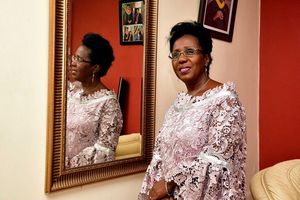
Naomi Wambui had to give up her job at the church after she became pregnant without doing a church wedding.
Naomi Wambui grew up in a strict Christian family. Typically, she was expected to have a proper church wedding — a white wedding to be precise — before settling down to marriage life.
For a moment, she seemed to have all her ducks in a row; a good religious man and two marriage proposals already. Then it all came tumbling down like a tipped-off tower of Jenga.
It started with some meddling from her fiancé’s side of the family. His loyalty seemed to lean more towards his mum than Naomi. The flag couldn’t get redder and she decided to call it quits even though they had started planning for the wedding.
After some time had elapsed, Naomi fell in love with another man. Unlike the first, this one wasn’t particularly keen on a big fancy church wedding. He proposed a traditional ceremony and Naomi obliged.
“Then I got pregnant before the traditional wedding. It wasn’t easy. I was in charge of so many projects in the church. I’d wanted to adhere to the church’s code of conduct but I found myself in a situation which went against the way the church wanted things done.”
Seeing no point in crying over spilt milk, Naomi decided to move in with the man who had impregnated her. She was a girl in love after all. A few months later, the baby came.
“Our firstborn came as a shock to many. We faced criticism,” says Naomi who is now a mum of three.
Although she knew she had stepped out of church norms, nothing prepared her for the harsh criticism meted out to her and her husband following the birth of their baby.
Naomi had to give up her job as church administrator, a position she had held for more than a decade, due to her ‘sinful’ marriage.
Thankfully, with her Diploma in Secretarial, Business Management and Theology, she was able to secure a job and now works as a bank accountant.
“Yes, I fell, but I got up, I dusted myself. The grace of God has been sufficient. I went back to church and renewed my vows to God because it’s my relationship with my God that matters. I still mentor the youth in church when I can because I believe that is my calling.”
***
Hilda Anjema was the head of the worship team and sermon interpreter at her church. She fell in love and after courting for three years, got pregnant before they could wed.
“I was distressed when I found out that I was pregnant because my Bishop was always warning me not to get pregnant before doing a church wedding.”
Hilda decided to keep off the church entirely during the pregnancy. She didn’t know how to face the bishop or the church members.
“My bishop used to call me because he expected me to be in church every Sunday to do my duties. I didn’t know how to tell my Bishop that I was pregnant or face my church members. I disappeared and even changed my mobile phone number.”

Hilda Ajema got pregnant after three years of courtship before she and her partner could wed.
Her husband was a keyboardist at a different church and for him, nothing changed. Perhaps it is because there was no physical ‘evidence’ that he had sired a child out of wedlock. He continued attending and serving at the church.
After the baby came, Hilda mastered enough courage to go back to God’s house.
“I asked one of my friends to escort me. I walked in and everybody looked at me with utter surprise. When I stood in front of the congregation to confess, I cried and told them that I was now a mother.”
Years later, Hilda still attends at the same church but no longer plays an active role in the service. Her perception of marriage has changed over time and in retrospect, she believes she should have been kinder to her younger self.
“I am a proud mother and a wife for four years now. To me, I think a white wedding is like a party to please people. I prefer the traditional marriage.” says the mother of one.
***
Betty Onyango’s fallout with the church was unexpected. She didn’t break any norms, at least none she was aware of. For Betty, deception landed her a murky territory that she would never have imagined herself in even in her worst nightmares.
Betty, a devout Christian, stuck with the church rules to the letter. In her courtship, she avoided visiting her fiancé’s house lest the devil sneaked a chance to tempt them.
She made sure they never missed a session of premarital counselling which was conducted by the senior pastor at her church. As a youth leader and a member of the praise and worship department, Betty was not ready to settle for anything less of a holy marriage.
In 2012, Betty had her dream wedding in church. After the honeymoon, she settled down ready to enjoy marital bliss. This was short-lived.
“One day, he [her husband] told me that his neighbour had financial problems. He asked if we could accommodate his children for a week before the neighbour could settle his problems. As a Christian, I agreed,” she says.

Betty Onyango found herself in a polygamous marriage after doing a church wedding.
This happened a few days after they came back from their honeymoon. A week later, the ‘neighbour’s’ children were still around and that’s when Betty began getting suspicious.
“I started noticing that one of the children looked like my husband. I’d gotten close to the children so when I asked them where their parents were, I was shocked to learn that they were my husband’s children.”
Word spread like bush fire and Betty was shocked to find herself on the receiving end of backlash for marrying a married man. The church became unbearable due to stigma and harsh criticism. She couldn’t believe what was happening to her. She stopped going to church for four months. Betty believes she missed the signs because she never visited his home.
“During our premarital counselling, I was advised never to step in his house to avoid romantic affairs outside wedlock. I lived in Nakuru while he was in Nairobi. I could only come to Nairobi when we had premarital counselling appointments.”
After processing the reality of her husband being a married man with four children, Betty quit the marriage. She has yet to officialise the divorce due to a lack of resources to pursue the legal process.
As much as women feel the church is harsher to those who have conceived a child out of wedlock than it is to men, Robert Waihenya Ngugi, a reverend and the Secretary General of the Presbyterian Church of East Africa, says that church leadership is guided by set doctrines and constitutions and that the consequences of not keeping the vows do not only apply to women.
“Where a boy impregnates a girl and they opt for come-we-stay instead of a church wedding, the woman is the one who is allowed to go for the catechism classes and after three months, she will be readmitted. But a man who has not had a church wedding, cannot go to catechism. He must wait until he marries officially then he is allowed to go back to the catechism classes after which he is then readmitted,” he explains.
He further notes that in a situation where the man wants to do the wedding but the woman is against it, then the man is allowed to go to the catechism classes and he is readmitted. A woman who is refusing the church wedding is on the other hand stopped from partaking in Holy Communion until she does a church wedding.
“If the girl gets pregnant then they do a church wedding still within the time of pregnancy, the situation is that they had broken their baptismal vows and therefore after the wedding, both of them will have to go back to the catechism classes,” he says.
He also explains that pastors are supposed to do a proper background check with families before conducting weddings to avoid circumstances like that of Betty's since polygamy is prohibited in the church.
It is important to note that church doctrine differs from one denomination to another. For instance, Rev Waihenya’s views are based on the doctrine of the Presbyterian Church of East Africa (PCEA).











